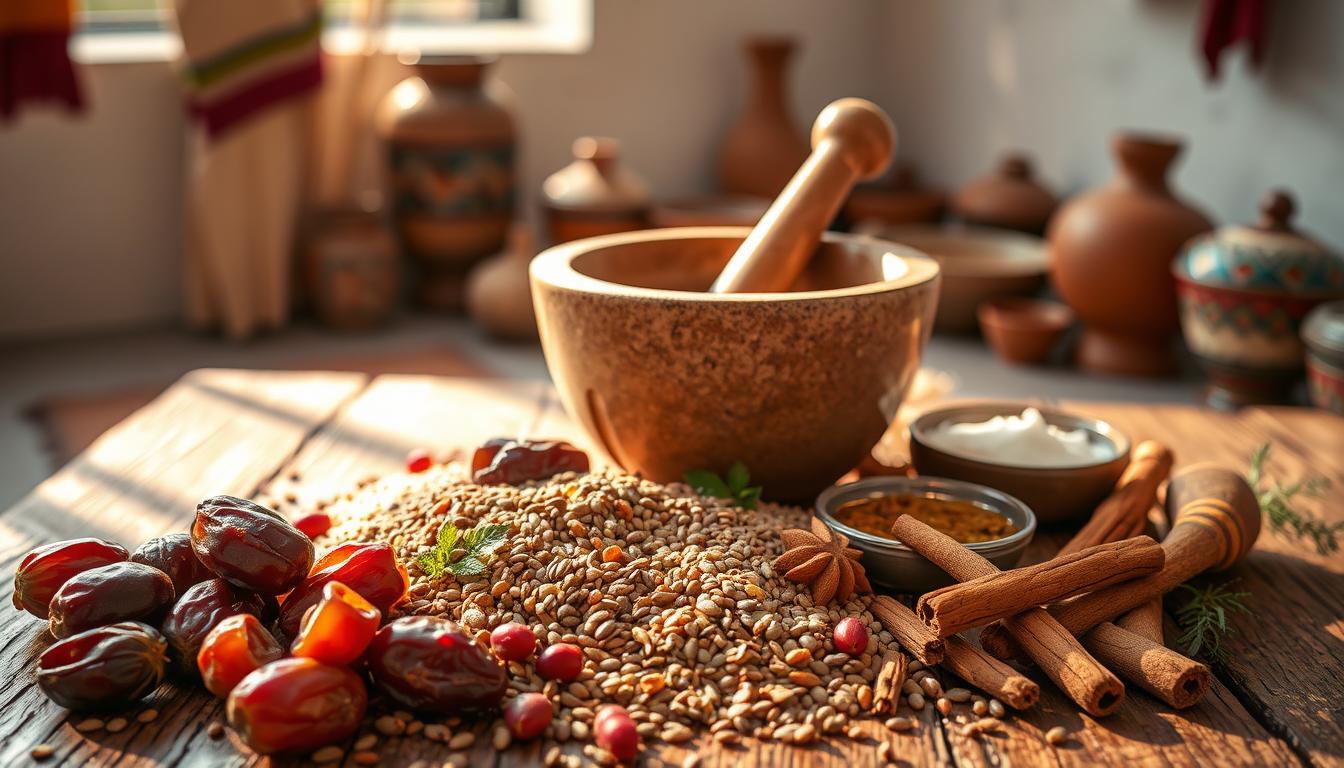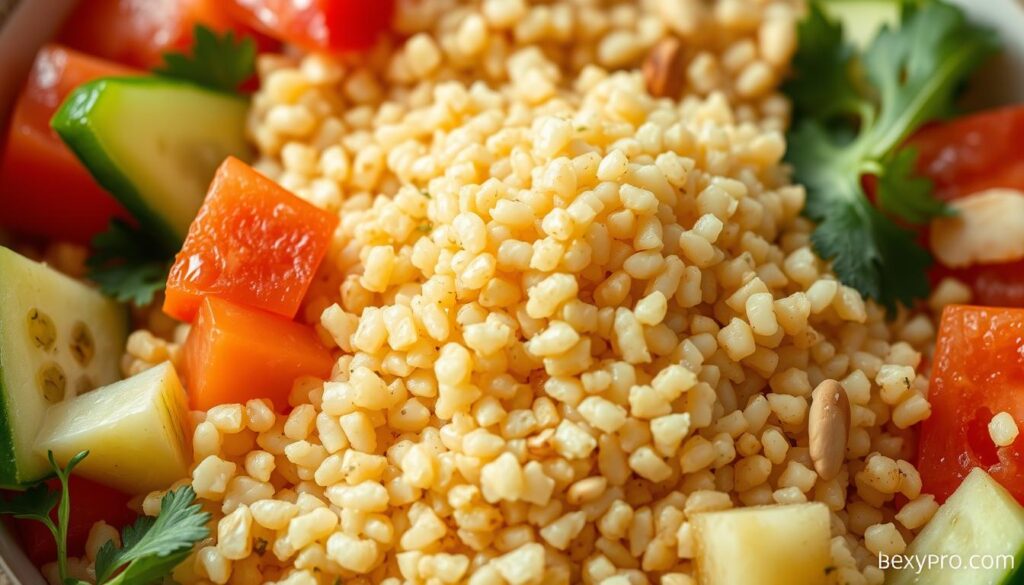Physical Address
304 North Cardinal St.
Dorchester Center, MA 02124
Physical Address
304 North Cardinal St.
Dorchester Center, MA 02124

Did you know that Morocco’s culinary traditions have been celebrated for centuries for their nutrient-rich ingredients? These foods are not only delicious but also packed with health benefits that can transform your daily wellness routine.
From the vibrant spices to the wholesome grains, Moroccan cuisine offers a treasure trove of functional foods. These ingredients have been used traditionally to support vitality and combat modern health challenges. Today, they are gaining global recognition for their practicality and effectiveness.
In this article, we’ll explore five standout options that are easy to incorporate into your diet. Whether it’s the zesty kick of ginger or the natural sweetness of dates, these superfoods can elevate your meals and enhance your well-being.
Morocco’s unique climate and geography create the perfect environment for nutrient-packed foods. With over 300 days of sunshine annually, the country’s fertile soils yield ingredients rich in vitamins and minerals. From the Atlas Mountains to the Mediterranean coast, this diverse landscape supports the growth of antioxidant-rich produce like oranges and dates.
Traditional preservation methods, such as sun-drying and fermenting, further enhance the nutritional value of these foods. These techniques not only extend shelf life but also concentrate essential nutrients, making them a powerful source of wellness.
Moroccan cuisine is deeply rooted in the concept of “food as medicine.” Dishes like tagines and couscous incorporate these nutrient-dense ingredients, offering both flavor and health benefits. For example, tagines often feature slow-cooked vegetables and spices, while couscous is a versatile grain packed with plant-based protein.
The global rise of Mediterranean diets has brought Moroccan food into the spotlight. Known for their balance of fresh produce, whole grains, and healthy fats, these diets are celebrated for promoting heart health and longevity. Moroccan ingredients are a cornerstone of this approach, offering a delicious way to support overall well-being.
| Superfood | Key Nutrients | Health Benefits |
|---|---|---|
| Dates | Fiber, Potassium, Antioxidants | Supports digestion, boosts energy |
| Oranges | Vitamin C, Folate, Fiber | Boosts immunity, improves skin health |
| Couscous | Selenium, Plant-Based Protein | Supports thyroid function, muscle repair |
From ancient remedies to modern kitchens, ginger remains a versatile ingredient. Its zesty flavor and potent health properties make it a staple in both cooking and natural medicine. Whether you’re adding it to a dish or brewing it into tea, ginger offers a range of benefits that can enhance your well-being.
Ginger contains gingerol, a bioactive compound known for its anti-inflammatory and antioxidant effects. These properties help reduce oxidative stress in the body, which can lower the risk of chronic disease. Studies have shown that ginger can alleviate symptoms of arthritis and migraines, making it a natural remedy for pain relief.
In Moroccan cuisine, powdered ginger is a key ingredient in spice blends like ras el hanout. This not only adds depth to dishes but also infuses them with health-promoting compounds. Whether you’re cooking a hearty tagine or a simple soup, ginger can elevate both flavor and nutrition.
Traditionally, ginger has been used as an aphrodisiac and digestive aid. Modern research supports these claims, showing that ginger can improve blood circulation and relieve nausea. It’s also effective in treating respiratory infections and lowering cholesterol levels.
For a quick health boost, try adding fresh ginger to your tea. This simple practice can support digestion and provide a warming, invigorating effect. As ginger continues to gain popularity, it’s now available in various forms, from supplements to extracts, making it easier than ever to incorporate into your routine.
| Benefit | How It Helps |
|---|---|
| Anti-inflammatory | Reduces pain and swelling |
| Antioxidant | Fights oxidative stress |
| Digestive Aid | Relieves nausea and improves digestion |
| Cholesterol Control | Lowers bad cholesterol levels |
Couscous, a staple in North African cuisine, is more than just a side dish—it’s a nutritional powerhouse. This tiny grain is packed with essential nutrients that can support your overall well-being. Whether you’re looking for a quick meal or a hearty base for your favorite dishes, couscous is a source of both convenience and nutrition.

One cup of couscous provides over 60% of your daily selenium needs. This mineral plays a crucial role in thyroid function and helps protect against certain types of disease. Selenium also acts as an antioxidant, reducing oxidative stress and supporting a healthy immune system.
For those looking to boost their selenium intake, couscous is an excellent choice. It’s easy to prepare and can be paired with a variety of ingredients to create a balanced meal.
With 6 grams of protein per serving, couscous is a great option for those following a plant-based diet. While it’s not a complete protein on its own, pairing it with legumes like chickpeas or lentils can provide all the essential amino acids your body needs.
This combination not only enhances the nutritional profile of your meal but also keeps you feeling full and energized throughout the day.
Traditional couscous is made from wheat, so it contains gluten. If you’re gluten-sensitive, consider alternatives like quinoa or gluten-free couscous varieties. These options offer similar textures and can be used in the same recipes without compromising flavor.
Couscous has a moderate glycemic index, making it a good choice for maintaining stable blood sugar levels. Pairing it with high-fiber vegetables and lean proteins can further enhance its benefits, creating a meal that’s both satisfying and nutritious.
| Type of Couscous | Key Features |
|---|---|
| Moroccan | Small granules, quick cooking time |
| Israeli | Larger pearls, chewy texture |
| Lebanese | Medium-sized grains, slightly nutty flavor |
Whether you’re making a simple salad or a hearty stew, couscous is a versatile ingredient that can elevate any dish. Its nutritional benefits and ease of preparation make it a valuable addition to your kitchen.
Dates are a natural powerhouse of energy, offering a sweet yet healthy alternative to processed sugars. Packed with essential nutrients, they’ve been a staple in traditional diets for centuries. Whether you’re looking for a quick snack or a natural sweetener, dates deliver both flavor and wellness benefits.

With 7 grams of fiber per 3.5-ounce serving, dates support digestion and keep you feeling full. They’re also rich in antioxidants, which help combat oxidative stress and reduce inflammation. Their low glycemic index makes them a smart choice for managing sugar levels, providing sustained energy without spikes.
Dates are incredibly versatile, used in both savory dishes and sweet treats. In traditional recipes, they’re often added to tagines for a touch of natural sweetness. They’re also a key ingredient in desserts like msemen, a popular pastry. For a protein-packed snack, try stuffing dates with almonds—a simple yet satisfying option.
During Ramadan, dates are a cherished part of the evening meal, offering quick energy after a day of fasting. Their high minerals content, including magnesium and potassium, supports heart health and muscle function. For a modern twist, blend dates into smoothies as a refined sugar substitute—it’s a delicious way to enjoy their benefits.
Oranges from Morocco are celebrated for their unmatched sweetness and nutrient density. Grown in the sun-drenched regions like Aourir’s “Banana Village,” these citrus fruits are a hydrating and immune-boosting snack. Packed with essential vitamins and minerals, they’re a delicious way to support your overall well-being.

A medium-sized orange provides 90mg of vitamin C, meeting your daily requirement. This nutrient is crucial for boosting immunity and promoting healthy skin. Oranges also contain flavonoids in their peel, which have antioxidant properties that reduce inflammation.
For a refreshing twist, freeze orange slices and add them to your water. This simple hack not only enhances hydration but also infuses your drink with a burst of citrus flavor.
Moroccan oranges are versatile and can be enjoyed in various ways. Local Surf Maroc endorses them as an ideal snack for surfers, providing quick energy and hydration. Their high vitamin C content also supports collagen production, improving skin health.
Whether eaten fresh, juiced, or added to salads, these oranges are a convenient and nutritious choice. Their natural sweetness makes them a healthier alternative to processed sugars.
| Orange Variety | Key Features |
|---|---|
| Navel | Sweet, seedless, easy to peel |
| Valencia | Juicy, ideal for juicing |
| Blood Orange | Rich in anthocyanins, vibrant color |
Nuts are a compact yet powerful snack, offering a blend of flavor and nutrition that’s hard to beat. Whether you’re on the go or looking for a quick energy boost, nuts provide a convenient way to fuel your body. They’re packed with healthy fats, protein, and essential nutrients that support overall well-being.
Nuts are an excellent source of monounsaturated and polyunsaturated fats, which are known to support heart health. Walnuts, for example, are rich in omega-3 fatty acids, which are crucial for brain function. Almonds and pistachios, on the other hand, are high in protein, making them a great option for muscle repair and sustained energy.
Research shows that regular nut consumption can reduce the risk of heart disease by improving cholesterol levels and reducing inflammation. Including a handful of nuts in your daily diet can make a significant difference in your long-term health.
In Morocco, nuts like almonds, peanuts, and pistachios are widely available in local souks. These markets offer a variety of options, from raw to roasted, allowing you to choose based on your preference. For a unique twist, try creating your own trail mix by combining nuts with dried figs and sesame seeds.
“Nuts are nature’s perfect snack—portable, nutritious, and delicious.”
When purchasing nuts, opt for unsalted varieties to avoid excess sodium. If you’re visiting Morocco, listen for the calls of “Cacahuète!” on the beaches, where vendors sell freshly roasted peanuts. This local experience adds a cultural touch to your snacking routine.
| Nut Type | Key Benefits |
|---|---|
| Almonds | High in protein, supports muscle repair |
| Walnuts | Rich in omega-3s, boosts brain health |
| Pistachios | Low in calories, promotes heart health |
Simple swaps in your cooking can bring a world of flavor and health benefits. Moroccan superfoods are versatile and easy to integrate into your meals, whether you’re preparing breakfast, lunch, or snacks.
Start your day with an orange-ginger chia pudding. Blend fresh ginger with orange juice, mix it with chia seeds, and top with crushed almonds. This breakfast is packed with nutrients and energy to kickstart your morning.
For lunch, swap rice with couscous in stuffed peppers. Couscous cooks in just 5 minutes, making it a quick and nutritious addition to any dish. Pair it with roasted vegetables and a savory-sweet date dressing for a balanced meal.
Try “Meatless Mondays” with plant-based couscous bowls. Add chickpeas, roasted nuts, and a drizzle of olive oil for a satisfying and healthy option. This simple change can make a big difference in your weekly routine.
Keep roasted nuts in your car for hunger emergencies. They’re a convenient, nutrient-dense snack that provides quick energy and supports overall well-being.
| Meal Idea | Key Ingredients | Benefits |
|---|---|---|
| Orange-Ginger Chia Pudding | Oranges, ginger, chia seeds, almonds | Boosts energy, supports digestion |
| Couscous Stuffed Peppers | Couscous, vegetables, date dressing | Quick, nutritious, and filling |
| Plant-Based Couscous Bowls | Couscous, chickpeas, roasted nuts | Supports heart health, muscle repair |
Small changes in your diet can lead to big improvements in your overall well-being. These nutrient-rich foods address modern issues like inflammation and energy slumps, offering a natural source of vitality. By incorporating them into your routine, you can enjoy long-term benefits for your health.
Visit local markets or specialty stores to find authentic ingredients. Exploring these foods connects you to centuries-old traditions while supporting your wellness goals. Sustainable dietary changes, like swapping refined sugar for dates, can make a significant difference.
Which superfood will you try first? Start today and experience the synergy of tradition and science in every bite. Your journey to better health begins with a single step.